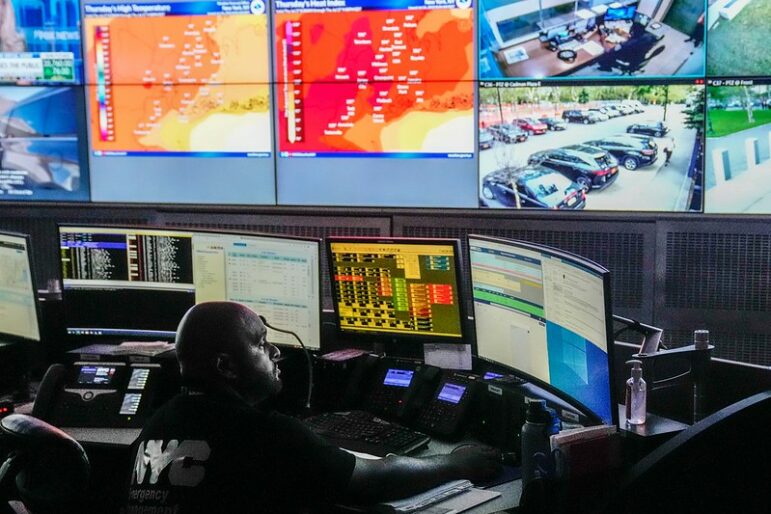“Take a moment to put yourself in your homeless neighbor’s shoes: how would you navigate our city’s patchwork of homeless services when you are hungry, experiencing pain, feeling unwell, being stigmatized by passersby, lacking access to a phone or a computer, and then contending with extreme weather conditions?”

Michael Appleton/Mayoral Photography Office
Workers in the New York City Emergency Management command center monitoring heat condition on July 27, 2023.New York City is preparing for its first official heatwave of this summer. And while many of us are able to stay inside, limit outside activities, and safely work from home, many of our city’s most vulnerable residents are not as fortunate.
A heatwave can be particularly dangerous for an unhoused New Yorker. Being unsheltered leaves people vulnerable to hyperthermia and other heat-related conditions that can lead to serious illness or even death.
It is estimated there are between 550,000 and 750,000 people experiencing homelessness in the United States on any given night and there are about 3,500 New Yorkers who are unsheltered. These are our family, friends, and colleagues who are struggling, for a variety of reasons, to find permanent and stable housing.
Take a moment to put yourself in your homeless neighbor’s shoes: how would you navigate our city’s patchwork of homeless services when you are hungry, experiencing pain, feeling unwell, being stigmatized by passersby, lacking access to a phone or a computer, and then contending with extreme weather conditions?
To make matters worse, as many as 60-80 percent of people who are unsheltered are living with serious mental illness or substance use disorder and these conditions are often one of the vulnerabilities that both lead to homelessness and also impair people’s ability to regain housing.
Providing effective mental health care not only helps relieve people’s suffering, but it also helps people regain housing. Many people who are able to access mental health care and social services are able to regain housing in supportive environments that help people maintain improved health and remain in that housing.
However, there are many obstacles to accessing such care. This is when the tools of community psychiatry are brought to bear. Community mental health clinicians provide person-centered care meeting people literally where they are, including outside in parks, on stoops, and at transit terminals.
We are experts and experienced at building and nurturing safe, trusting therapeutic alliances that encourage and support people to engage in treatment that will mitigate symptoms and suffering, which in turn enables people to more effectively participate in the processes that lead to housing. This is often slow, painstaking work. Trust takes time, persistence and patience that can take weeks or even months of consistent outreach.
At CUCS and across New York City, service providers are building these relationships every day by utilizing a number of tools and program structures at our disposal. Here are just a few:
- Intensive Mobile Treatment (IMT): An innovative model that began in New York City seven years ago to serve people who move between street locations, shelters, providers, and institutions. IMT teams utilize flexibility and creativity to engage and collaborate with people who have not been able to effectively participate in other systems of care.
- Trauma-informed Care: Practices that encourage and support individuals to regain a sense of control and establish psychological and physical safety.
- Primary Care and Behavioral Health Integration: Currently practiced by Janian Medical Care in New York City, psychiatrists and street medicine providers are embedded into outreach teams to provide coordinated health care alongside social services.
Helping an unsheltered person regain housing can be a complicated, slow process, but we know what helps: Meeting people where they are. Nurturing collaborations that feel safe and respectful. Offering flexible, creative care and services. Having access to permanent supportive housing that people can call home. Most of all, this service requires compassion.
Our fellow New Yorkers who are unsheltered are facing daunting circumstances and challenges. Compassion gives those of us who serve the strength to join people to face these challenges. Compassion from everyone else allows people to rejoin a community that cares for its most vulnerable.
Dr. Van Yu is the chief medical officer for the Center Urban Community Services (CUCS) and its healthcare affiliate Janian Medical Care.
Dr. Anthony Carino is the director of psychiatry at Janian Medical Care, a healthcare affiliate of the Center for Urban Community Services.








